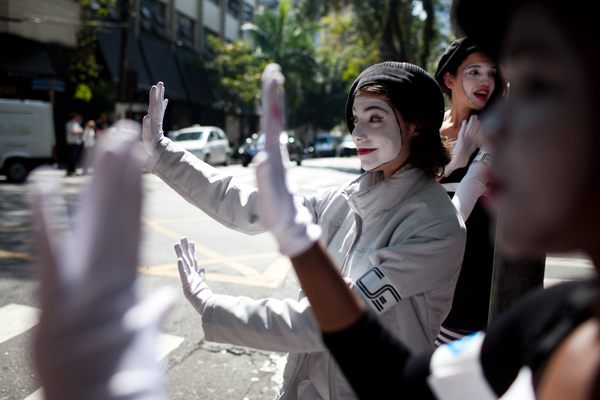The Wildly Popular Colombian Soap Opera Even the Government Stopped to Watch
When coffee-induced passion was a matter of national importance.
If you were to walk the streets of Bogotá at 8:00pm in 1994, you would have been confronted by a strange sight. The city, which at most other times is a constant bustle of traffic jams, street vendors, buses, and pedestrians, would be relatively quiet, almost at a standstill. Foreigners might be confused, but locals knew the reason, most likely because they were partaking in it themselves. The cause? A soap opera called Café, con aroma de mujer (Coffee, With the Scent of a Woman).
Now, soap operas in Latin America come and go. Some achieve wild success, some get lost in the jumble of television channels that constantly churn out novelas like very well-oiled machines. Few, however, have ever reached the status of Café, as Colombians affectionately refer to it. The soap is the second most-watched program in the country, right behind Ugly Betty, which in 2010 was declared by the Guinness Book of World Records as the most successful soap opera of all time (both soap operas were written by the now-acclaimed Fernando Gaitan).
Given its success, it is strange to think that the premise of Café is fairly simple, and somewhat predictable: A poor young woman nicknamed Gaviota travels around looking for work at coffee plantations. At one such plantation, she meets Sebastian, the rich and handsome heir of a well-to-do family. Of course, they fall madly in love. Villains, misunderstandings, and tragedies separate them, but in the end (spoiler alert) their love wins and they get married.

Such a premise has been endlessly repeated in soap operas. Yet this time, the story didn’t just enjoy popularity, it quite literally changed the daily life of Colombians. As Alejandro Jose Lopez Caceres explains in his book, Between the Pen and the Screen: Reflections on Literature, Film, and Journalism:
The streets and avenues of the main cities of the country turned ghostly at 8 p.m., the time of emission, for a moment, in the halls of the Senate, the arguments weren’t between liberals vs. conservatives, but between supporters of Dr. Salinas vs. supporters of Sebastian; the President gave his opinion on what the best ending was for Gaviota; congressional sessions ended sooner and several debates had to be put off until morning […] the same happened in bars, in neighborhoods, in universities, in brothels.”
In their daily lives, people took the same approach as congress seemed to have taken: whatever it was, it could wait until after Café. Or, as Cristobal Errazuriz, who played the story’s main villain, explained in a TV special dedicated to the soap:
You couldn’t call any house after 8 p.m. because they would insult you. “Ah, we’re watching Café!” It was a phenomenon, they played it on the buses. While it was being aired, the buses would play its audio, so that the people who couldn’t get home could listen to it while on the bus.
Those on cars and motorcycles would often carry a portable TV with them, so they could watch it while driving home. Hang outs, appointments, and other rendezvous had to be scheduled around the sacred time.

If Café’s importance continues to be doubted, one need only look at this entry in one Colombian history textbook’s chronology:
1993: The soap opera Coffee, With the Scent of a Woman is aired. Law 100 established universal social security. Pablo Escobar dies in Medellin at the hands of the police.
Café, in other words, ranks alongside universal social security, and the death of Colombia’s most feared terrorist and drug kingpin.
But why would an entire country forego policy making, meetings with friends, and road safety for a soap opera with a seemingly unoriginal plot? The answer, or part of it, lies in the title.
Coffee has been one of Colombia’s main exports since the beginning of the 20th century. It is a source of livelihood for many, and a source of pride for all. In the beginning of the 1990s, coffee was a especially sensitive topic. The country’s golden era of exportation had been abruptly cut short with the end of the International Coffee Pact in 1989. With new competition and unregulated prices, the product’s value was no longer stable, and Colombia suffered because of it.

This suffering was monetary, of course, but also moral. Colombia’s coffee-growing axis is in many ways its heartland, and coffee is one of the products that the country is proud of exporting. In the mists of the armed conflict and the height of cartel problems, this was even truer. As Lopez Caceres references when talking about Café,
In several countries around the world, in Latin America as well as in Europe, for many months the name of Colombia was not associated with cocaine but with Coffee, With the Scent of a Woman.
A 1995 article in El Tiempo claims that the success of the soap opera “resides in its being a faithful reflection of contemporary Colombian life.” Its depiction of life both in the coffee region and the capital, of corruption, of the realities of class divisions in the only country in the world that quantifies social class, and, according to the article, of the constantly frustrated dreams of a better life, brought it close to the hearts of Colombian. By following the strong-willed Gaviota’s struggle through the corruption and classism of an industry so intrinsically tied to the national identity, the entire country saw itself represented on screen.

At the same time, as Marco Palacios and Frank Safford say in Colombia: Fragmented Country, Divided Society, the script “suppressed the devastation of extortion, rampant crime, and kidnapping to which Colombian families have been exposed.”
The soap opera, in other words, had the ability to both bring Colombians closer to the center of their reality, while simultaneously letting them escape from it.










Follow us on Twitter to get the latest on the world's hidden wonders.
Like us on Facebook to get the latest on the world's hidden wonders.
Follow us on Twitter Like us on Facebook